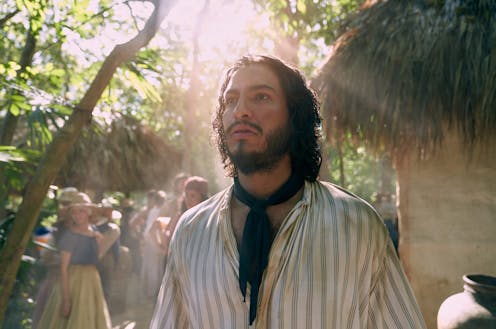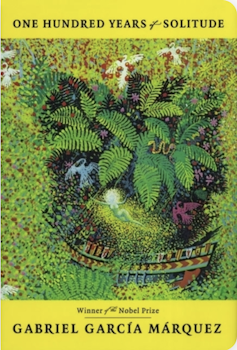
I have read Gabriel García Márquez’s One Hundred Years of Solitude five times.
The first was at someone’s recommendation and because I am the author’s namesake; the second was halfway through my PhD, (heavy on García Márquez); the third and fourth were when I taught the novel as part of a course on Latin American literature. Most recently, I read the book because Netflix is about to release an adaptation of the novel, which I find exciting and alarming in equal measure.
Each re-read is like catching up with a good, old friend: I am reminded of things I haven’t thought about in years, and there are moments I haven’t forgotten, which I genuinely enjoy revisiting.
Most important of all, in this last re-read I realised both the novel and I have changed. We’ve aged, but I’d love to think we’ve aged well.
The story
First published in 1967, One Hundred Years of Solitude takes place in Macondo, an imaginary town in Colombia based on Aracataca, García Márquez’s hometown. The book begins with the character of Colonel Buendía in one of the most captivating opening sentences of 20th century literature:
Many years later, as he faced the firing squad, Colonel Aureliano Buendía was to remember that distant afternoon when his father took him to discover ice.

From this we might infer the book’s main character is Colonel Aureliano, but he isn’t; the Buendía family is the protagonist here.
The novel tells the family’s story across seven generations (most readers need a family tree to keep track, and most editions include one.) It goes back to José Arcadio Buendía and Úrsula Iguarán, who found Macondo in the middle of the jungle, and it finishes roughly 100 years later with baby Aureliano, the cursed child born with a pig’s tail.
One Hundred Years of Solitude is funny, tragic, sensual and political. The novel explores cyclical time, meta-fiction, social taboos, the history of Latin America and more specifically, Colombia.
The Buendías are constantly entangled in passionate and unhealthy love affairs, driven by their obsessions, haunted by their secrets. Members of each generation repeat, or respond to, the destructive choices of the last, the patterns of behaviour they are raised with and locked into.
The arrival of an unnamed American banana company to Macondo brings modernity to the town, and García Márquez’s historical, political commentary on an often-ignored chapter of Colombia’s past, the “banana massacre” of 1928. The events his novel describes are strikingly similar to the real-life massacre that took place in the Colombian town of Ciénaga, where workers of the American United Fruit Company went on strike demanding fair pay and better working conditions.
The workers were machine-gunned to a pulp by the Colombian military at the behest of the United Fruit Company. The death toll is not known, but estimated in the thousands. The fact that a powerful company was able to get away with it, and then calmly deny the massacre with impunity led to the creation of the term “banana republic”.
García Márquez’s style is a joy to read. In English, his sentences appear long at times, subclause after subclause of strikingly poetic but poignant thoughts and descriptions.
Readers in Spanish are used to long, flowing sentences. However, in this book we see the birth of an of elaborate syntax that is extraordinary, even for Spanish standards (the culmination of this can be found in what some consider García Márquez’s best work, the later novel Autumn of the Patriarch. The book’s last chapter – all 50 pages – is a single sentence, and it is stunning.)
Magical realism?
There is magic in Macondo, but in García Márquez’s novel, magic rarely warrants surprise or excitement. When José Arcadio Buendía discovers the alchemical formula for turning metals into gold, his son is quick to tell him his glossy treasure looks “like dog shit”.
To everyone’s delight, the local priest in Macondo, Father Nicanor Reyna, levitates when he drinks hot chocolate, until the trick becomes irritating, and he gets beaten down by the military.
A scion of the Buendías, Remedios the Beautiful, is so unfathomably attractive, her looks so pure and otherworldly, that she ascends to Heaven, like Jesus. Unlike Jesus, her ascension is not after a crucifixion and resurrection, but whilst taking out the washing (which, inconveniently, she takes with her).
When readers hear the term “magical realism”, the first author who comes to mind is usually García Márquez. It is a style of writing where supernatural, magical events happen, and the characters who experience them think they are normal. Magic is mundane, annoying even.
It is different from fantasy, where there is a sense of awe associated with magic, and it is also different from “the fantastic”. According to critic Tzvetan Todorov, the latter is a style of writing grounded in doubt, where the reader is unsure of the nature of the events taking place (fantastic or not), and the plot is usually driven by the resolution of that mystery. (These are, of course, generalisations; the world of fantastic literature is not a world but a multiverse, and exceptions to the above abound).
The term “magical realism” was coined in 1925 by the art critic Franz Roh, who used it to describe a style of painting that we would now classify as post-expressionism. The 1940s and 1950s saw the rise of two pylons of Latin American literature: the Argentine author Jorge Luis Borges, and Alejo Carpentier from Cuba.
Borges and Carpentier lay the foundations for what we now call magical realist literature, and for the famous literary movement of the 1960s, the “Latin American Boom”, during which authors like Carlos Fuentes (Mexico), Mario Vargas Llosa (Peru), and Julio Cortázar (Argentina) were widely read and praised the world over.
The “detonator” of “the boom” was Márquez’s One Hundred Years of Solitude.
The novel’s impact
A truly revolutionary work, Marquez’s novel is comparable with the modernist breakthroughs of James Joyce and Virginia Woolf, and with Franz Kafka’s fantastic existentialism.
In terms of style, it opened the doors to new ways of writing, but it also decentralised Europe as the heart of new literature. The first edition of the novel sold out in a matter of weeks, unheard of for a Latin American author.
It was alternatively referred to as “the Bible”, or “the Don Quixote” of Latin America, with García Márquez lauded as a new Miguel de Cervantes. The book’s success set the stage for García Márquez’s Nobel Prize for Literature in 1982. The novel has sold more than 45 million copies. García Márquez, who died in 2014, is one of the most translated Spanish-language authors in the world.
One Hundred Years of Solitude has also inspired a generation of internationally famous magical realist authors like Salman Rushdie, Isabel Allende, Eka Kurniawan, and Haruki Murakami.
There is so much more to say about this book: from the influence of William Faulkner (Faulkner’s Snopes trilogy takes place in a fictional county modelled on a real one, and the genealogy of the Snopes family branches out in detail like the Buendías) to the group of young Latin American authors in the 1990s who rejected One Hundred Years of Solitude and started the “McOndo” movement to oppose it (a wordplay on “McDonalds” and “Macondo”).
The novel has aged, but mostly well, I think. There are observations on gender roles and queerness, for example, that won’t resonate with contemporary readers, but which evidence not only the time and place when it was written (Mexico City in the 1960s), but the times and places evoked in García Márquez’s fiction. Many of us may not agree with these views, but they are a chronicle (albeit fictional!) of how many Latin Americans used to think about these topics.

What I reflected most upon during my recent re-reading, is that García Márquez maintained throughout his career that he wrote about reality in his novels, not magic.
In The Fragrance of Guava, a series of interviews between García Márquez and Colombian journalist Plinio Apuleyo Mendoza, he explains: “there is not a single line in my novels which is not based on reality”.
Reality, he says, “isn’t limited to the price of tomatoes and eggs; everyday life in Latin America proves that reality is full of the most extraordinary things”.
According to García Márquez, reality is much more magical than we give it credit for, and realism is not always the right vehicle to do it justice; sometimes it falls short. The depth, complexity, and wondrous nature of the everyday may require other means.
And so, the magical realist style of One Hundred Years of Solitude raises another question, which is not unique to Latin America, but applicable to all of us: if magic can be commonplace, can the commonplace be magical too?
That is the tacit, hopeful underside to García Márquez’s novel, that what is magical can be a matter of perception. We can find it in a seed, the smell of chocolate, or in the miracle of our existence as primates made of stardust, briefly held together by self-awareness, and if we’re fortunate enough, by love, which according to García Márquez, is the antithesis of solitude.
Gabriel Garcia Ochoa does not work for, consult, own shares in or receive funding from any company or organisation that would benefit from this article, and has disclosed no relevant affiliations beyond their academic appointment.
This article was originally published on The Conversation. Read the original article.







